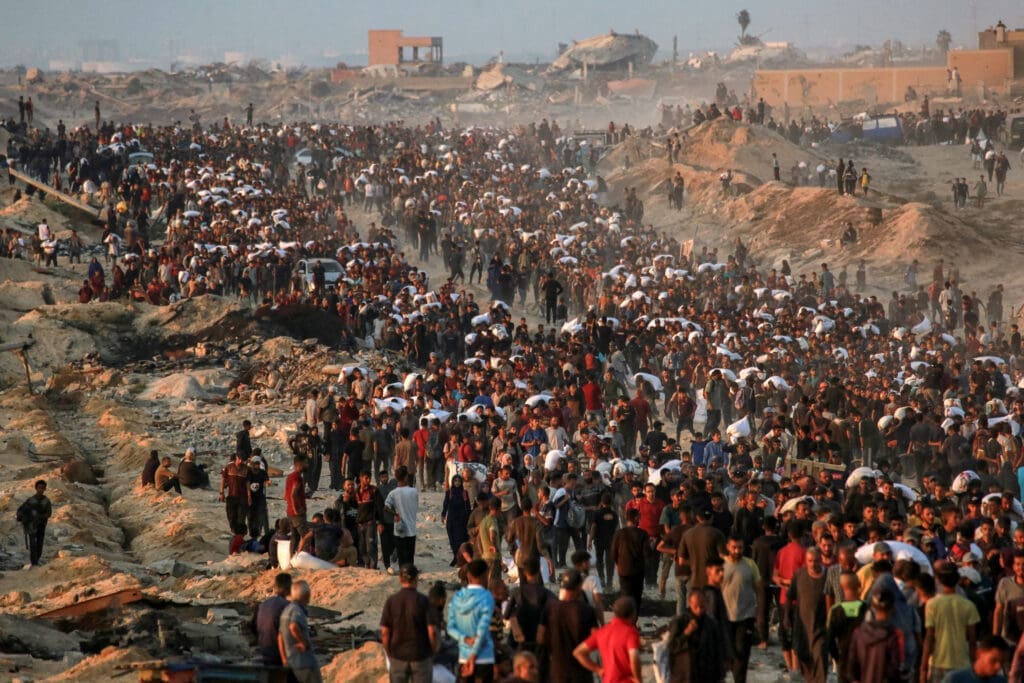The scenes of horror have become a regular occurrence. Tens of thousands of desperately hungry Palestinians packed into endless metal queues under a blistering sun, subjected to biometric scanning as they flood a dystopian aid complex, hoping for a box of food. Each day, hundreds are killed or wounded while making the harrowing choice between getting something to eat and risking being shot.
As the genocidal violence unleashed against defenseless Palestinians of Gaza surpasses 20 months, and as the population plunges deeper into famine, the choice before governments with leverage, and above all the United States, is stark. Act now to stop a foreseeable, preventable famine and the forced expulsion of an entire people, or become complicit in one of the gravest moral failures of our time. This is no moment for ambiguity, hesitation or vacillation. It is a moment that demands moral clarity, political courage and decisive action. Over two million lives—half of them children—hang in the balance.
The harrowing scenes out of Gaza of starving Palestinians desperately seeking food are not incidental; they are the direct result of a new aid distribution scheme launched earlier this year. Far from a genuine humanitarian effort, this coordinated operation between Israeli authorities and the United States bypasses the United Nations and established relief agencies under the pretext of keeping aid out of Hamas’ hands. In reality, it is a militarized project—Israeli-designed and U.S.-executed—with oversight handed to the newly created, U.S.-based Gaza Humanitarian Foundation (GHF). At its core lies an objective far more sinister than relief: the forcible displacement and mass transfer of a civilian population by withholding of aid— a war crime under international law.
What is being presented as aid distribution is, in effect, a trap: a cage baited with food, designed to lure the starving into a tightly controlled zone of surveillance, humiliation and possible removal. By concentrating Palestinians in the southernmost part of Gaza, near the Egyptian border, the strategy appears to lay the groundwork for their mass expulsion into Egypt. Far from a humanitarian lifeline, this aid system serves as a calculated step in a broader campaign of forcible depopulation. The strategy eerily mirrors President Donald Trump’s earlier proposal, which envisioned the United States “owning” Gaza, relocating its population, and converting the territory into a “Riviera of the Middle East.” According to the United Nations, more than 640,000 Palestinians have been displaced since Israel resumed military operations in Gaza on March 18, violating a two-month ceasefire and deepening a humanitarian crisis of biblical proportion.
Though described as an independent and neutral operation, the new aid project reportedly originated within Israeli government circles in the early weeks of the genocidal campaign. Aid and human rights organizations unanimously denounced the initiative, asserting that it violated the core principles of humanitarian action: humanity, neutrality, impartiality, and independence. Just one day before the organization was set to launch its operations, GHF’s executive director, resigned, citing a lack of independence as the reason for stepping down.
When Israel launched its latest military offensive — ominously dubbed “Operation Gideon’s Chariot” — reports suggested that a key objective was the mass displacement of most of Gaza’s population to the southern part of the Strip, particularly the city of Rafah. Once home to over 200,000 residents, Rafah has since been transformed into a wasteland. These reports were soon echoed by Prime Minister Netanyahu himself, who confirmed plans to relocate Gaza’s entire population to a so-called “sterile zone” in the south, while Israeli forces operate elsewhere. Addressing Israeli reservists, Netanyahu went further, stating that Israel’s ultimate goal is the complete removal of Palestinians from Gaza; the main obstacle, he noted, being the identification of third countries willing to accept them. Palestinians know they will have little say in their cruel fate.
Since October 7, 2023, Israel’s wide range of violations in Gaza, including large-scale killing, widespread destruction of civilian infrastructure, forced displacement and mass starvation, cannot be dismissed as collateral damage or a by-product of a military campaign. They reflect a deliberate, systematic policy planned and coordinated at the highest levels of the Israeli government and its military establishment. The objective is clear: the depopulation of Gaza through a pattern of grave international crimes that bear all the hallmarks of genocide.
In popular discourse, genocide is thought of in terms of extermination through organized mass killing. However, the Genocide Convention embodies the idea that a group can be “destroyed” by acts that fall short of mass murder. The Israeli government’s strategy increasingly appears to rely on the twin tactics of forcible displacement and the destruction of conditions necessary for life. This includes the deliberate deprivation of food, medical care, shelter and safety—all fundamental to survival. Such acts, when carried out against a targeted population, amount under international law to war crimes, crimes against humanity and, indeed, genocide. The intent is not necessarily immediate extermination, but rather a slow, grinding destruction: the calculated erasure of a people through policies designed to starve, sicken and expel them. All of this is taking place in the shadow of deafening international silence, creating conditions of impunity that embolden Israel to continue its actions unchecked and without accountability.
This campaign of forced displacement is not a deviation from past policy, but rather a continuation—and intensification—of Israel’s decades-long settler-colonial project. At its core, this project is rooted in the erasure of Palestinian identity and the dispossession of their land. Israel has systematically imposed a system of pervasive and deliberate restrictions on the freedom of movement of Palestinians, holding civilians under a rigid permit regime and automated apartheid, stripping them of autonomy, and subjecting even the most routine aspects of daily life to bureaucratic and military authority.
An Obligation to Prevent and Punish Genocide
The Genocide Convention imposes both a legal and moral obligation on all states to prevent and punish genocide. This responsibility is not passive; it requires proactive measures to end, prevent, investigate and punish genocide and to protect vulnerable populations from destruction. Every state party to the Convention is bound by this legal framework. Yemen, acting within the constraints of the Genocide Convention, has imposed a blockade on Israeli-bound ships in the Red Sea to prevent genocide and force an end to the starvation siege on Gaza.
Given Israel’s egregious violations of international humanitarian law, most notably the deliberate starvation of civilians and obstruction of humanitarian aid, as well as its open defiance of the provisional measures issued by the International Court of Justice (ICJ), third-party states face an urgent and unambiguous obligation to act. States that continue to provide Israel with political and diplomatic cover, financial assistance or military support cannot credibly claim neutrality. Under international law, such support renders them complicit in two critical ways: first, by failing to prevent genocide as mandated by Article I of the Genocide Convention; and second, by enabling it—an explicit form of complicity under Article III(e). In the face of mass atrocities, silence and inaction are not neutral positions. They are forms of participation.
All governments have a duty to prevent genocide by ensuring the delivery of large-scale humanitarian aid to avert famine and by taking meaningful steps to stop the forced displacement of the Palestinian people. Yet, in practice, only one government holds the power to decisively alter the course of this man-made humanitarian catastrophe: the United States.
With a single phone call, President Donald Trump could demand an immediate and permanent ceasefire and the unconditional release of all Israeli and Palestinian captives. Under the threat of an arms embargo to Israel, he could pressure Netanyahu to fully reopen all border crossings, ensuring sustained and unhindered humanitarian access throughout the entire Gaza Strip, in line with the core humanitarian principles of humanity, impartiality, neutrality and independence, and demand the full reversal of the ban on the UN Relief and Works Agency.
Under U.S. and international law, President Trump should take further action by suspending all transfers of military equipment, services, and assistance to Israel. He should impose lawful and targeted sanctions on Israeli leaders and others suspected of involvement in atrocity crimes, initiate investigations into allegations of genocide, war crimes and crimes against humanity, and support international efforts to hold those responsible accountable.
For a president who pledged in his inaugural address to measure success “not only by the battles we win, but also by the wars we end, and perhaps most importantly, the wars we never get into,” and who declared that his proudest legacy would be that of “a peacemaker and a unifier,” the tragedy unfolding in Gaza now stands as a defining test of that promise.
As Israel continues its unprovoked assault on Iran—an act of aggression seemingly intended to divert global attention from its ongoing genocide in Gaza and the ethnic cleansing of a besieged, starving population—all eyes must remain on Gaza.


